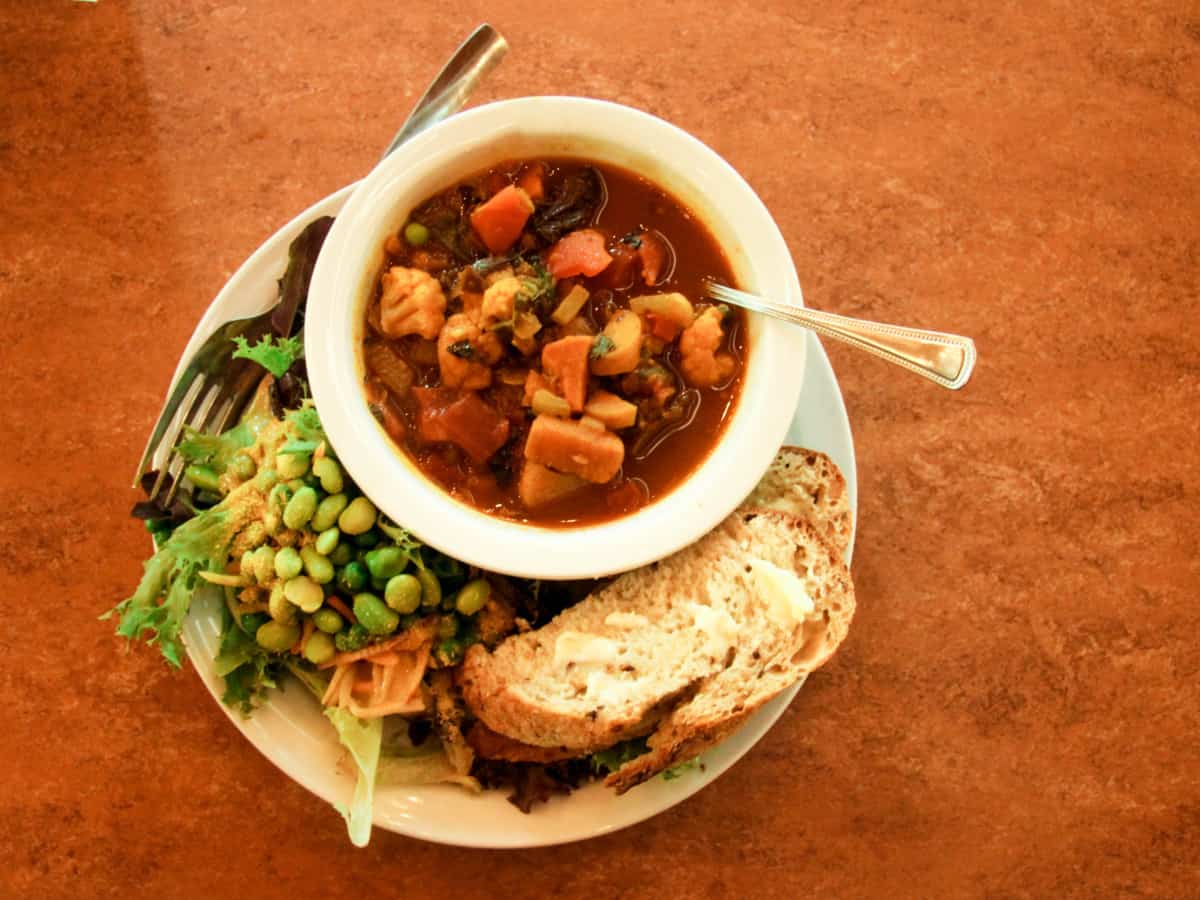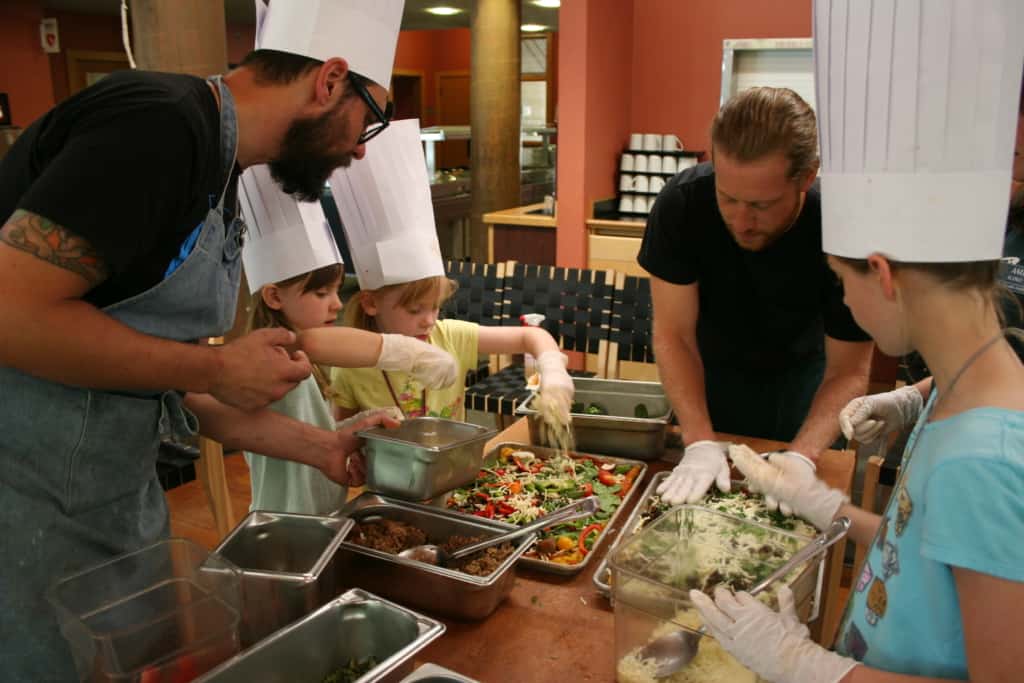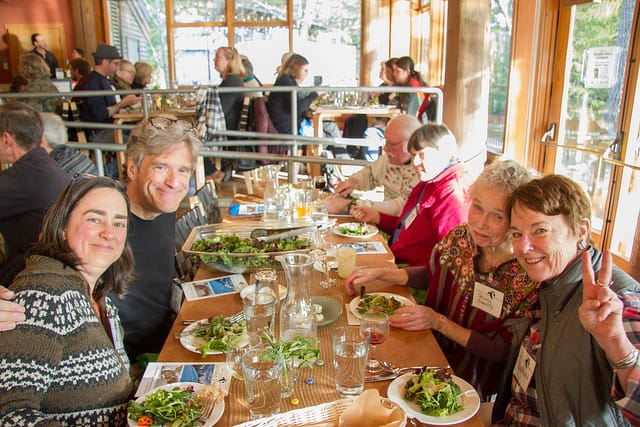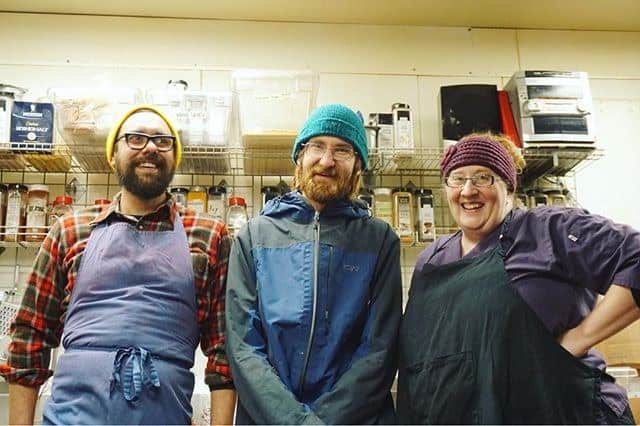
North Cascades Foodshed: Eating With Our Values
Since its official opening in 2005, the Environmental Learning Center has developed a reputation for high quality educational opportunities with world-class accommodations. The state-of-the-art facility offers overnight lodging for up to 92 program participants, classrooms, indoor and outdoor meeting spaces, a library and a plethora of trails to explore within a stone’s throw of Diablo Lake. Yet, what consistently stands out for many participants is the food we serve.
While most people come to our campus to learn and explore the North Cascades, The Institute believes that in order to learn well and play well, you also need to eat well. Which is why we also provide high quality, nutritious meals to all of our program participants. However, offering good food by itself isn’t enough for the high environmental and ethical standard to which we strive. In order to better walk our talk, we need to also be thinking about the relationship we have to our food, our community, and the land that provides our sustenance.

In 2003, the North Cascades Institute launched its Foodshed Initiative. This initiative recognizes that the food we consume has an impact not just on our bodies, but on the land, air and water resources of our planet. Just as one can think of a watershed as the source of water for a particular area, Foodshed refers to the source of the food that we serve on campus being local and sustainable. In an effort to minimize our impact and support local food producers, we are committed to ensuring that meals are sourced locally and produced organically. This means partnering with local farmers and serving food that is seasonally and regionally specific to the Pacific Northwest.
Additionally, The Environmental Learning Center operates an extensive composting operation, including 2 composting Earth Tubs, for food waste. This allows us to literally give back to the land in the form of nutrient-rich soil from which our food comes.
Foodshed is not a concept that is exclusive to the North Cascades Institute. In fact, many environmentally-conscious organizations around the world have adopted Foodshed initiatives to support local economies, reduce environmental impact and combat climate change. But like many of the things we do, The North Cascades Institute holds itself to a higher standard than the average. The metric that we use for our Foodshed is far more stringent than most other places that promote themselves as “eat local”.
250 miles is the common metric used by most universities implementing a locally sourced food initiative … We thought we could do a bit better and decided to reduce our Foodshed to 125 miles, or roughly the distance between us and Seattle.
— Chef Justin Daniels
This might seem restrictive, no bananas for example, but The Environmental Learning Center is actually situated in an ideal location for local agriculture. Despite of being in the middle of a National Park, our 125-mile Foodshed covers both the Skagit and Methow valleys, two of the most agriculturally rich areas in Washington state, which allows for a great diversity of crops from both West and East of the mountains.

In 2018, the Foodshed program reached several important milestones, including receiving 100% of our fresh produce from organic sources, and reaching 94% of our total food products from local or organic sources, up from 70% in 2015 and exceeding our goal of 90% set at the start of the year. While in some cases, this is more expensive, it is important to our mission and it is a way we can educate people on the importance of considering food as a way to make more sustainable choices.
Looking ahead, Foodshed’s goals for 2019 are to diversify our relationships to include more Skagit-based Latinx farmers. Currently, Chef Justin is working with Kate and Rob Smith of Viva Farms to develop relationships with Latinx-owned farms that have the capacity to provide the volume of food we require and could use the extra business. In this way, we can expand our Foodshed capacity while also ensuring that the money we spend is distributed equitably and that more of the community we share is represented in the food that we serve.
If you have never enjoyed a meal at the Environmental Learning Center, now is a great time to register for our upcoming programs and events. The food alone is worth the experience!
Our Foodshed by the numbers
2003
The year Foodshed Initiative began
125
Distance in miles from the North Cascades Environmental Learning Center campus that qualifies a producer as a Foodshed vendor
58,973
Participant meals served in 2018
$56,368
Dollars spent with Foodshed vendors in 2018
$97,875.90
Dollars spent on organic produce, meat, dairy, beverages, and dry goods in 2018
90%
Target percentage for organic purchasing in 2018
94%
Actual percentage of grocery budget spent on Organic and Foodshed in 2018
100%
Percentage of fresh produce served in the dining hall that is local and/or organic
0
Bananas purchased annually
7
Farm Partners currently, including:
- Well Fed Farms, Mt. Vernon
- Osprey Hill Farms, Acme
- Highwater Farm, Mt. Vernon
- Whitehorse Meadows Farm, Arlington
- Ruby Slippers Farm, Twisp
- Sauk Farm, Concrete
- Viva Farms, Mt. Vernon
foodshed at Mountain School
200
Local cage-free organic eggs consumed at an average Mountain School breakfast
50
Gallons of scratch-made Ranch Dressing consumed during a 12 week Mountain School session
3
Kitchen staff make breakfast, lunch, and dinner for Mountain School students, instructors, and chaperones
1,440
Hours required for kitchen staff to produce meals for a single Mountain School season
240
Times each eating utensil is washed in a 12-week Mountain School season
50
Gallons of scratch-made ranch dressing consumed during an entire 12-week Mountain School season
Looking forward: Foodshed goals
2019
Year that North Cascades Institute will establish a baseline for dollars spent with minority farmers in our Foodshed
5
Target percentage for annual growth of spending with minority farmers in each following year
51
Target percentage for Foodshed dollars spent with minority farmers by 2021
Special thanks to our fabulous kitchen crew for their hard work every day to ensure we eat well, and support our local farms while we do it!



Wonderful food in a wilderness setting! So, how about offering some cooking classes using foraged foods?
Hi T, thanks for your comment! We are currently offering a mushroom foraging and cooking course in the fall, you can sign up today at ncascades.org/classes In the spring, we head to the shores to forage for seaweed. If you aren’t already on our email list, join today at ncascades.org/fieldnotes to be of the first to know when our classes are open for registration.